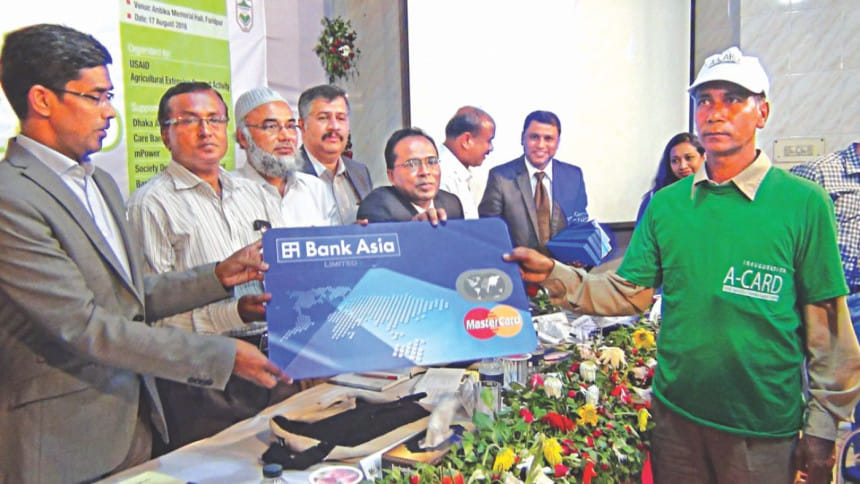Debit card for farmers

Farmers, in near future, may no longer need to queue up at banks for farm credits nor need to go to the banks or kiosks to withdraw cash. All they would need to do is use their preloaded debit cards to buy agro-inputs.
For purchasing seeds, fertilisers, pesticides, weedicides or fuel, growers would pay retailers through NFC (near field communication) -enabled smart biometric point of sale (PoS) devices.
Retailers would be equipped with smartphones with a “payment gateway app” that would deduct the money from the debit cards. The smartphones would be their PoS.
The NFC is a set of protocols that enables two devices to establish communication between them when both of them are within about 4cm of each other.
This would be the first banking experience for the predominantly unbanked farmers of Faridpur, Bhola and Barguna.
Under a multi-actor initiative, led by the USAID Agricultural Extension Support Activity, the farmers would get, in phases, the A-card
(agriculture credit card) with top-up farm loans ranging from Tk 10,000 to 20,000 each.
They would payback with 10 percent yearly interest rate chargeable only on the amount spent. The payback time would begin after six months.
The three-district (Faridpur, Bhola and Barguna) pilot, involving 2,500 farmers, had a soft launch in Faridpur on August 17 with a promise to soon expand the A-card among 110,000 growers in 12 south-central and southern districts. The districts are Jessore, Magura, Faridpur, Rajbari, Khulna, Satkhira, Narail, Barisal, Bhola, Pirojpur, Barguna and Patuakhali.
The A-card in an initiative to help farmers access microfinance through banks.
If successful, this pilot could transform the state of small agricultural loans in Bangladesh and increase uptake of digitally-enabled agricultural purchases, said agricultural experts.
Unlike standard MFI (microfinance institutions) loans, which generally have a cumulative annual interest rate of 25-31 percent and require weekly repayments over a 46-week period, the A-card venture is easier in both counts of low interest rate and delayed payback time.
The USAID Agricultural Extension Support Activity (Ag Extension Project) entrusted the Dhaka Ahsania Mission (DAM) to help develop farmers' access to microfinance through banks. The DAM took along CARE Bangladesh and mPower as its technical partners and together they shaped the A-card initiative.
It is to their credit that they took a commercial bank, Bank Asia, on board and ensured a good marriage between the bank and some of the local NGOs in the command areas, who have been acting as MFIs.
In this process, the commercial bank having lesser number of branches and staffs in the countryside would be using the MFIs as its agents and share the profit among themselves.
Mokhlesur Rahman of Faridpur, who grows rice, wheat, jute and rapeseeds, is one of the earliest recipients of the A-card.
“I'll be able to buy agro-input from designated retailers with the A-card. There'll be no weekly paybacks, no cash transactions. I'll payback only after six months,” the farmer told The Daily Star over the phone.
Bidyuth K Mahalder, chief of party of Ag Extension Project, said as the designated retailers were authenticated by the USAID and Bank Asia, farmers would get a fair price and unadulterated inputs.
The A-card holders, said Mahalder, would repay their debts six months after spending the money and that is why “they would be in no hurry to sell their produce at throwaway prices at the beginning of harvesting just because of the pressure from traditional loan providers”.
Ahsan Ul Alam, Bank Asia vice-president for agent banking, told The Daily Star that the pilot has signed up 10 input retailers in Faridpur from the Agro-Input Retailers Network, which is managed by the USAID's Agro-Inputs Project.
“Each retailer would be equipped with the PoS devices. This would enable farmers to buy inputs directly from designated retailers using their card, instead of first having to withdraw the balance of their loan in cash. All purchases would be verified using fingerprints, which will ensure that only intended farmers have access to their accounts,” said Ahsan.
This pilot is the only example to date in Bangladesh where a bank and MFIs have partnered to extend micro-credit agricultural loans to farmers, said the Bank Asia VP, adding that participating farmers would be able to receive lower interest loans with more flexible repayment options, along with having the convenience of being able to use their cards to securely and easily purchase inputs from participating retailers.
Anowarul Haq, director of Extreme Rural Poverty Program of CARE Bangladesh, said they have provided technical support to the A-card initiative. He hoped that if the pilot goes well, it would be a great opportunity for smallholder farmers to have easy access to farm credit.
According to Bangladesh Bank statistics, over Tk 17,000 crore is disbursed each year as farm loans by some 55 nationalised, specialised, commercial and foreign banks in the country.

 For all latest news, follow The Daily Star's Google News channel.
For all latest news, follow The Daily Star's Google News channel. 



Comments